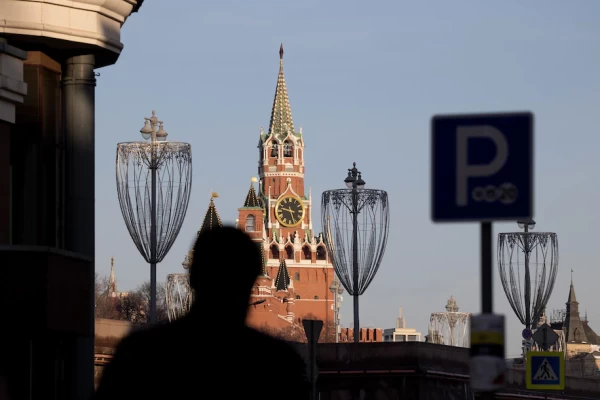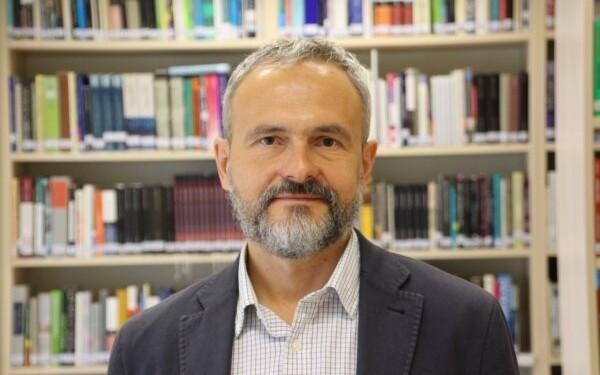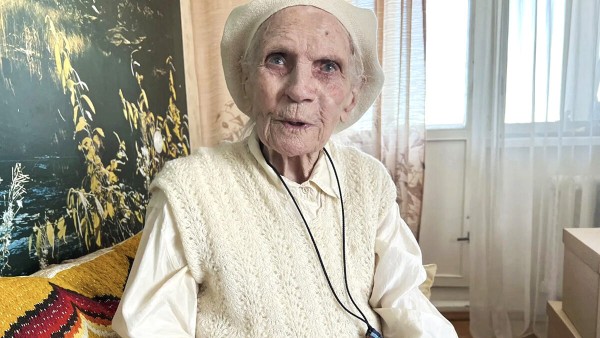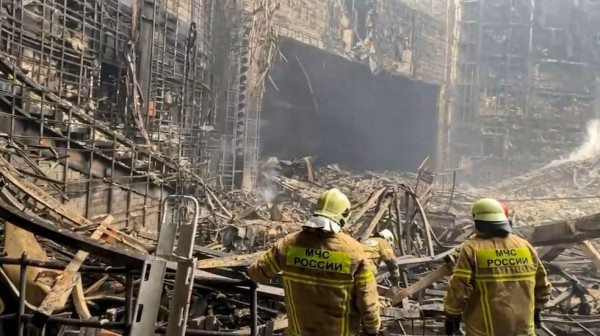MOSCOW — On Sunday, police brutally dispersed a group of demonstrators who came to Moscow’s Pushkin Square, the traditional site of dissident rallies since the Soviet era, to denounce Vladimir Putin’s presumptive attack on Ukraine. The protesters, who included veteran human rights leader and former member of parliament Lev Ponomarev, were detained as soon as they unfurled their banners; some were taken into police custody and charged with violating Moscow’s strict ban on public demonstrations imposed under the pretext of the pandemic. (Needless to say, the ban applies only to opposition rallies. When Putin addressed 80,000 people packed into a stadium to mark the anniversary of the annexation of Crimea, the authorities had no objections.)
The weekend protest was only the latest in the growing chorus of voices within Russia itself opposing Putin’s threats to Ukraine — a trend that has been underreported by international media, leaving many Westerners with the impression that everyone in Russia supports the war. This is certainly not the case. In recent days, the country’s leading cultural figures — who traditionally hold significant moral clout here — have spoken out against an attack on Ukraine. “Russia does not need a war with Ukraine or with the West,” read a statement signed by, among others, rock musician Andrei Makarevich and actress Liya Akhedzhakova. “Nobody is threatening us, nobody is attacking us. The policy that pushes for war is immoral, irresponsible and criminal.”
One of Russia’s greatest contemporary novelists, Lyudmila Ulitskaya, denounced the Kremlin’s war plans as “madness.” Acclaimed pianist Evgeny Kissin declared that those who provoke war will be remembered as “bloodthirsty criminals.” Renowned tennis player and former Grand Slam champion Yevgeny Kafelnikov said that “only someone psychologically deranged can threaten war.” Separately, Yabloko, Russia’s last genuine opposition party that still has registered status, initiated a nationwide public petition opposing an attack on Ukraine. Thousands signed within days. “This is not our war,” said Boris Vishnevsky, one of the party’s leaders and a member of the St. Petersburg legislature. “I still hope war can be avoided. And only we, Russian citizens, can stop it — not the West … not anyone from the outside.”
For all the difficulties of measuring public opinion in an authoritarian state — where all television networks are controlled by the government and where many people are understandably hesitant to share their political views with pollsters or other strangers — the available surveys point to the strong unpopularity of a military attack on Ukraine among Russian citizens at large. Most Russians neither favor sending troops to Ukraine nor buy into the Kremlin’s narrative of treating the West as an enemy.
Whether domestic opposition to the war in Russia can have any practical effect is far from certain. What is certain is that by raising their voices against yet another Kremlin aggression, members of Russia’s cultural elite, acting in the best traditions of Russian and Soviet intelligentsia, are upholding the nation’s honor in the same way the seven demonstrators who protested on Red Square against the Soviet invasion of Czechoslovakia did in August 1968. “A nation minus me is not an entire nation. A nation minus ten, a hundred, a thousand people is not an entire nation,” recalled Natalia Gorbanevskaya, a poet and one of the 1968 demonstrators. “So [the authorities] could no longer say that there was nationwide approval for the invasion of Czechoslovakia.”
In more democratic times in Russia, opposition to the Kremlin’s acts of aggression was not limited to those brave enough to face imprisonment or worse for confronting an authoritarian regime. In January 1991, more than 100,000 people stood on Manezhnaya Square in Moscow, just outside the Kremlin walls, to denounce the Soviet military attack on Lithuania. In the 1990s, mass rallies were held in Moscow and St. Petersburg in opposition to the brutal crackdown in Chechnya. When Communist lawmakers tried to impeach then-President Boris Yeltsin in May 1999, their liberal colleagues shrugged off the effort as political theater — yet even some of those skeptics ended up voting for the article condemning the war in Chechnya (falling short of a two-thirds majority by just 17 votes).
Back then, Russia had a real parliament. In contrast, last week the rubber-stamp Duma passed a resolution on a formal diplomatic recognition of the two Kremlin-backed separatist enclaves in eastern Ukraine without much debate by 351 votes to 16. (All the main “opposition” parties were in agreement. In fact, it was the Communists who helpfully introduced the motion for the Kremlin’s benefit.)
If Putin really does attack Ukraine, he might be doing so at his own peril. Russian rulers do not have a good track record of “small victorious wars” launched for domestic political purposes — from the czarist regime’s disastrous campaigns in Crimea and Japan in the 19th and early 20th centuries to the invasion of Afghanistan in the waning years of the Soviet Union. The result is usually the opposite of what was intended. “For Russia, such wars end not only unsuccessfully, but often in a political catastrophe,” warned Professor Andrei Zubov, an eminent historian who was fired from Russia’s top diplomatic academy in 2014 over his opposition to the annexation of Crimea. “We know what public attitudes were after the defeat in the Russo-Japanese war of 1905 [leading to Russia’s first revolution]. We could have the same now. We could face a situation when people won’t accept this gamble by the regime.”
For someone as obsessed with Russian history as Putin, it would be ironic if he were to stumble into one of its most oft-repeated mistakes.
https://www.washingtonpost.com...
It’s not just the West that opposes Putin’s war on Ukraine. A lot of Russians do, too. (1)
Eestlased Venemaal | 21 Feb 2022 | Vladimir Kara-MurzaEWR
Viimased kommentaarid
Kommentaarid on kirjutatud EWR lugejate poolt. Nende sisu ei pruugi ühtida EWR toimetuse seisukohtadega.
Eestlased Venemaal
TRENDING

























